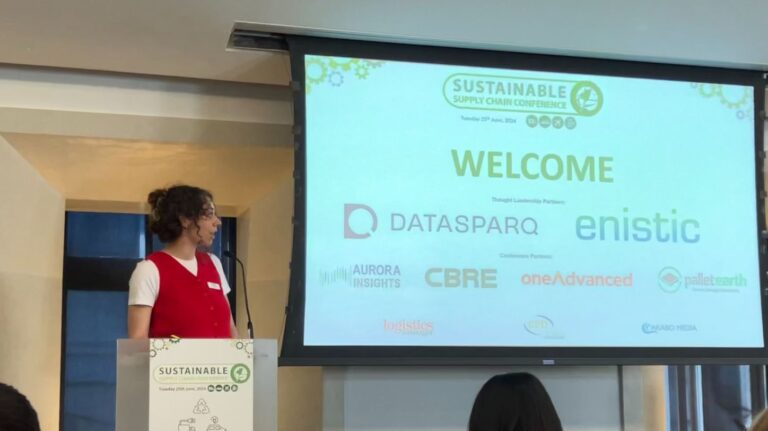This morning [25 June] the 2024 edition of Logistics Manager’s Sustainable Supply Chain Conference got underway.
This one-day face-to-face event provides delegates with the opportunity to hear directly from industry-leading speakers about how business sustainability can influence their bottom line.
Before delving into some of the incredible insights shared by expert speakers, Logistics Manager would like to thank the sponsors of this event: Aurora Insights, CBRE, Datasparq, Enistic, OneAdvanced and Pallet Earth.
Editor of Logistics Manager and chair of the conference Emily Uwemedimo kicked off the day with her opening remarks, in which she highlighted some of the key focuses of supply chain sustainability strategies, including decarbonisation and the circular economy. “Together, through knowledge sharing, collaboration and innovation, we can navigate the complexities of the supply chain landscape and pave the way towards a sustainable and resilient future,” she said.
In the first session of the day, Khanh Mach, sustainability specialist at Quorn Foods gave a presentation entitled ‘Sustainability can’t exist in a silo in a business – how to bring colleagues and partners on this journey’, emphasising the importance of engaging colleagues throughout a business in its sustainability journey.
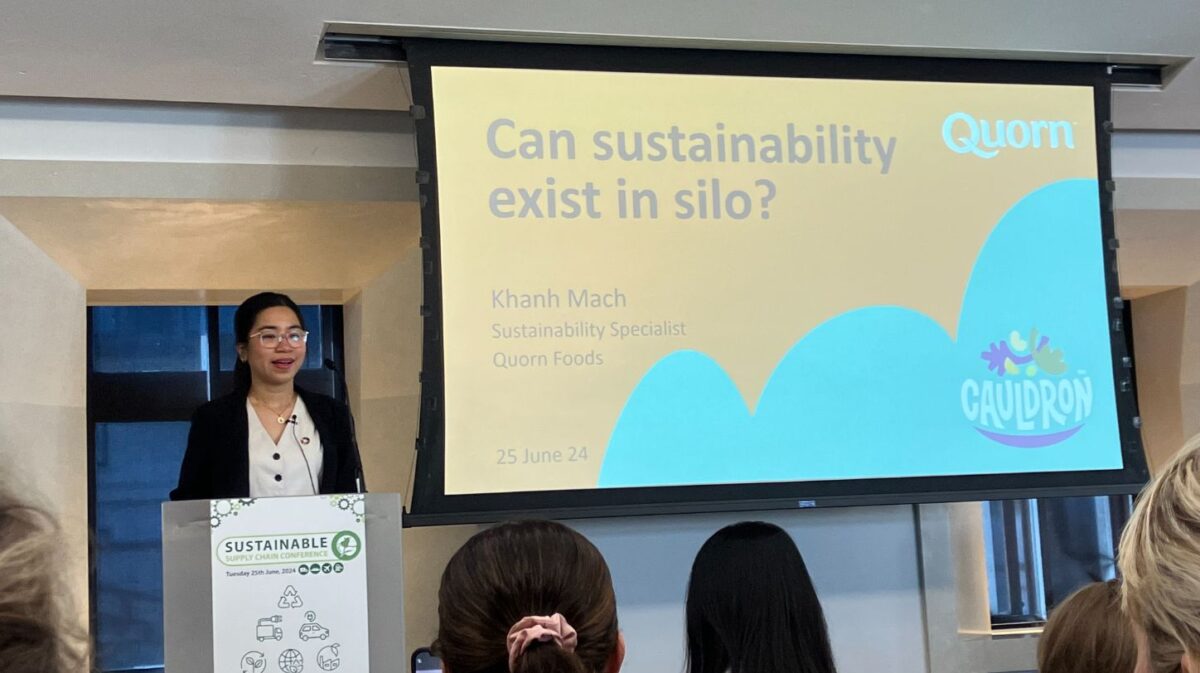
She spoke about Quorn’s net positive ambition, which aims to deliver a positive impact on people, the planet and the food system through its “four key pillars of action”: supply, operations, product and society. Its work towards this goal has included taking action such as ensuring 100% of its packaging is recyclable or reusable and 100% of its supply is “responsibly sourced”.
Mach described this net positive ambition as “an objective that everyone in our business will have to set for themselves”. She explained: “When employees are engaged [with a company’s sustainability strategy], they are happier and more motivated.”
To engage employees with Quorn’s sustainability objectives, Mach explained that the company has organised townhall meetings and team engagement sessions, launched a dedicated intranet page and created a network of Sustainability Champions who “cascade the message to their wider team and report on progress”.
The result of this work can be seen in Quorn Foods’ Employee Survey. From 2022 to 2023, Quorn saw a 5% increase in average engagement rate for sustainability questions, a 5% increase in employees believing their team are personally committed to Quorn’s net positive goals and a 6% increase in employees believing that Quorn as a whole is committed to having a positive impact on the environment.
Responding to a question from the audience about engaging non-office-based employees, Mach revealed that training can play a key role, claiming that Quorn is launching a series of online courses to give all employees “a chance to understand the topic”.
After that, Jacquie Silvester, head of sustainability and improvement at The Cotswold Company, shared her views on the importance of sustainability as a priority within the boardroom. Her session, entitled ‘Sustainability deserves a better ranking on the business strategy’, covered why ESG is important and how progress can be made.
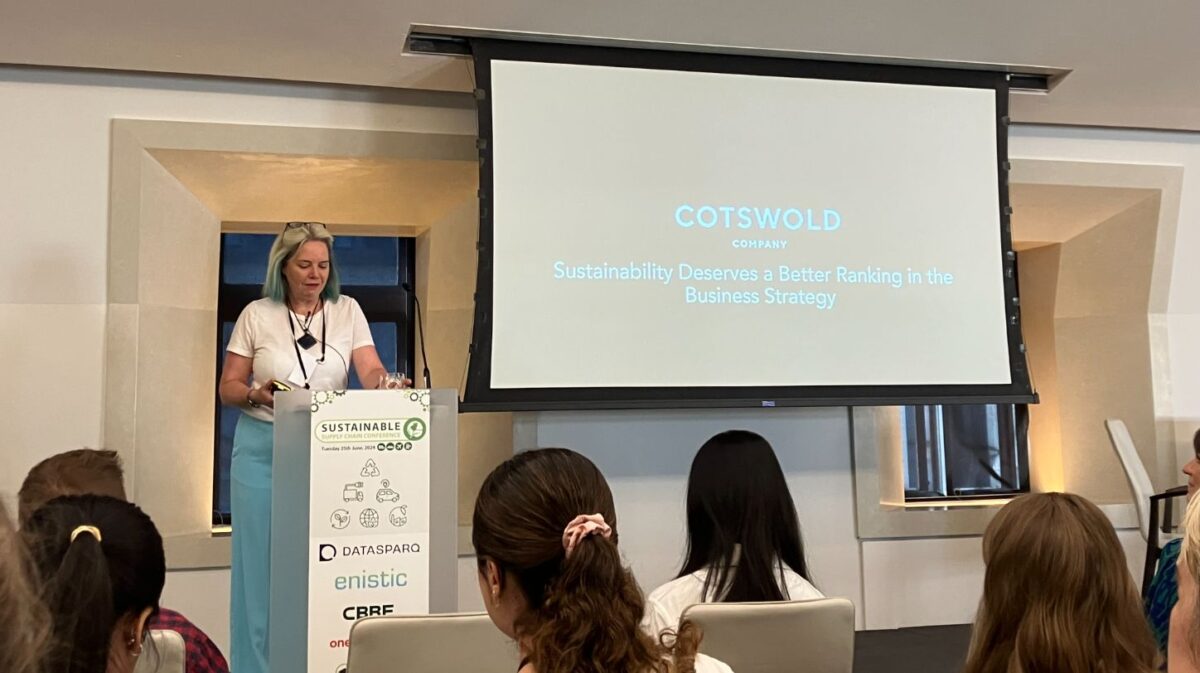
Having spoke at the 2023 edition, she reflected on the company’s progress in the past 12 months, with The Cotswold Company having made progress in the initiatives she spoke about last year, including applying for B Corp certification.
Silvester noted that “89% of investors look at ESG” and “41% of consumers are choosing sustainable products”. She went on to say that companies with a clear and effective ESG strategy are seen as less of a risk by investors as they are better prepared for the future.
She acknowledged the difficulty that can often be found when looking at making sustainability improvements within a business as a result of competing motivations such as profitability. She emphasised the importance of preserving biodiversity, ecosystems and natural beauty, but recognised that this is not always factored into business decisions as it does not obviously and directly impact profit and loss.
To make the case for sustainability being a priority in a business’ strategy, Silvester conducted SWOT analysis, identifying strengths, weaknesses, opportunities and threats when it comes to ESG. She also spoke about double materiality assessments, which she said requires collaboration between all stakeholders in a business.
One challenge with undertaking a double materiality assessment, Silvester said, was the concern that it would result in a “unanimous vote for action that we couldn’t do because of financial restrains”. To combat this, she explained how companies can engage with stakeholders to understand their priorities and map the feasibility and importance of any action regarding sustainability.
She noted the value of company-wide engagement in the sustainability strategy, with support from executives, directors, employees, investors, green ambassadors and customers. “Having more voices in the narrative has helped me to move along in our sustainability journey at The Cotswold Company,” she concluded.
Then at 10:00am, delegates were able to hear an interesting and engaging panel discussion, moderated by Datasparq’s client director Tom Hart. Speaking with the AI specialist’s principal product lead Ishbel Hughes-d’Aeth and GXO Logistics’ head of transport solutions Richard Cowley, Hart delved into how AI is transforming sustainability within supply chains.
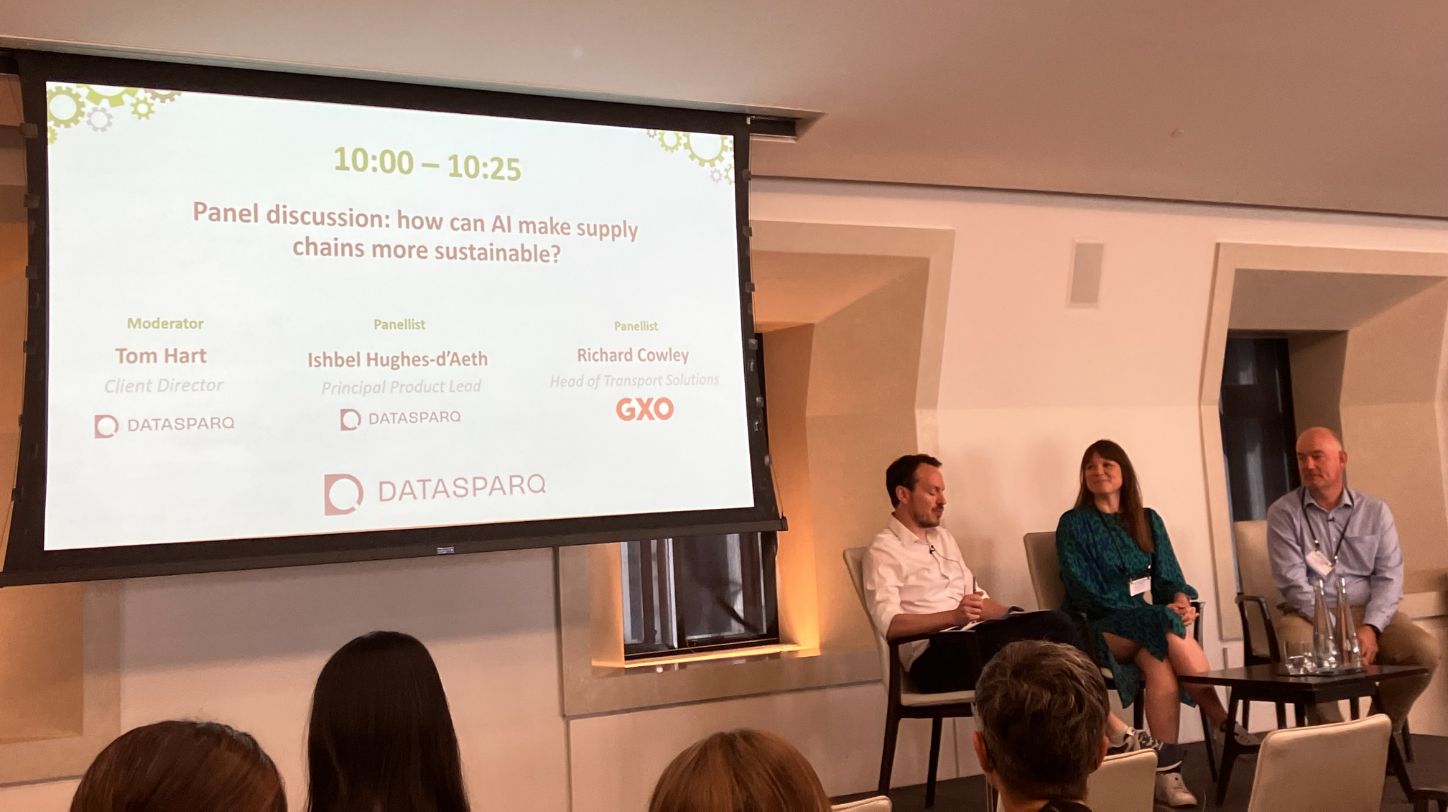
The panel discussed their firsthand experience of this, presenting a case study surrounding the collaboration between Datasparq, GXO and Iceland that allowed the retailer to cut over 700 tonnes of carbon emissions through the introduction of AI-powered route optimisation.
Hart started the session by saying “AI is not new, but recently with ChatGPT it has been brought much more into focus”. When asked about AI’s role in the supply chain, Hughes-d’Aeth identified that, currently, AI’s biggest strength is “synthesising information” and “identifying trends” which can then be used to inform business decisions, whether made by a human or the AI itself.
Cowley explained that one of the biggest benefits of its AI adoption is the “sheer processing power”, which he estimated is up to 1,000 times more powerful than the previous systems in place. Hughes-d’Aeth added: “The number of possible solutions for a vehicle making 60 deliveries is greater than the number of observable atoms in the universe.” AI, she said, can assess these options in a way humans would not be able to in order to find the optimal solution.
In response to a question from Logistics Manager about the changing role of humans in the supply chain as AI becomes more intelligent, Hughes-d’Aeth acknowledged that there is a perception that AI can replace humans, but claimed that it still has its limitations and, for now at least, it is still “important to keep humans in the loop”.
Speaking on the longer term, she said: “Humans, I believe, are going to be closely involved with the development and running of AI solutions.” Cowley concurred, saying that “someone still needs to ask the question”, and noting that humans are still needed to assess the practicality of solutions.
After a short networking break, delegates returned to their seats to hear from Alex Florea, head of sustainability at skincare company Medik8, about the value of B Corp certification. Her session, entitled ‘B Corp – the blueprint for business as a force for good’, aimed to demystify B Corp by taking the crowd through Medik8’s own certification journey and what the company has learnt from it.
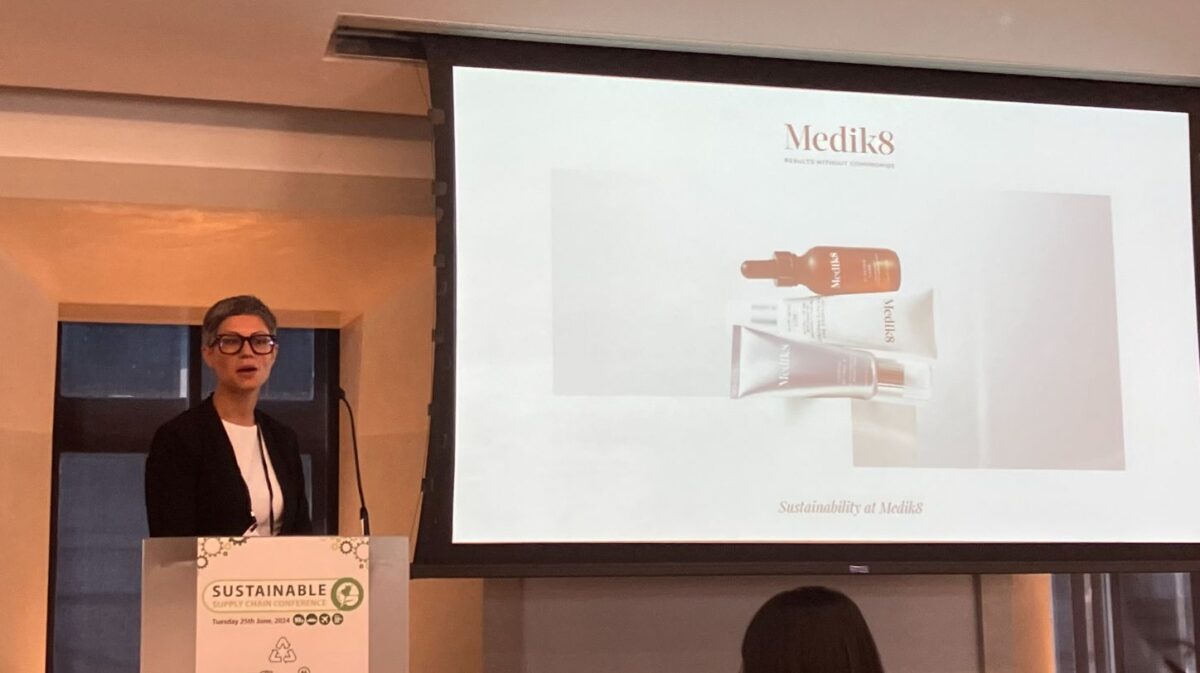
Florea shared an insight into Medik8′ sustainability plan, which includes achieving net zero by 2040. She spoke about how B Corp companies have are required to: “meet high standards of social and environmental impact; make a legal commitment to to take into account the interests of workers, customers, suppliers, communities and the planet, not just shareholders; and be transparent and share their performance publicly”.
She talked delegates through the current B Corp certification process from start to finish and explained what benefit B Corp certification offers businesses. She said: “The thing that’s really key to B Corp is the idea of continuous improvement. It’s not a one-and-done requirement.” She explained that a B Corp company needs to recertify every three years, each time proving that it has made significant progress since the last time it was assessed.
In terms of benefits, Florea highlighted key areas in which firms can see a positive impact, ranging from gaining a greater understanding of sustainability within the supply chain to support for and recognition from the wider community.
She also covered the new requirements for B Corp certification, which are expected to be implemented from 2026. She described these new requirements as “a positive step forward”.
Florea offered delegates tips for B Corp certification from her own experiences, recommending that firms complete the initial B Impact Assessment honestly and start preparing for recertification early, amongst other recommendations.
Next up was Fiona Humphries PIEMA, quality and sustainability compliance lead at gin distillery Sipsmith, with her session entitled ‘Our battle with Scope 3 emissions: Sipsmith’s ongoing search for solutions’.
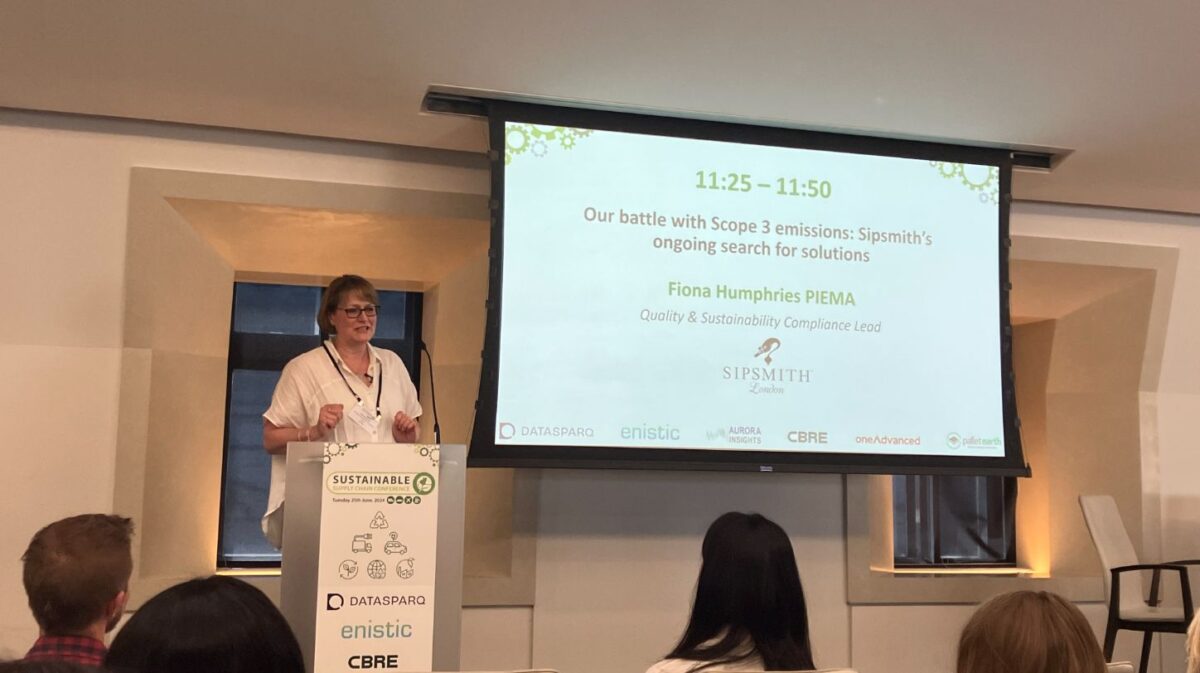
She explained how measuring carbon footprint has helped Sipsmith on its sustainability journey, as well as how the company has considered eliminating air freight, changing its bottling plant and changing its bottles to be more sustainable.
“The distillation and distribution of gin creates carbon emissions,” she noted, explaining that improving sustainability is only possible if there is knowledge of emissions and wastage, which is why “measurement is so important”.
She added: “Legislation [around sustainability] is tightening up. That screw is getting tighter and tighter and tighter.”
Referencing Lao Tzu’s philosophy that “a journey of a thousand miles begins with a single step”, she spoke about how Sipsmith were “shocked” about its use of air freight and initially implemented a policy which required the demonstration of a “critical commercial need” for air freight before it could be signed off, eventually leading to the elimination of air freight in Sipsmith’s supply chain.
“We can’t do anything if we don’t collaborate with other people,” Humphries reiterated, emphasising the value of positive and open communication and collaboration with suppliers, colleagues, customers and the community, especially when it comes to Scope 3 emissions.
Taking a slightly different direction, Ed Ayton, sustainability and ethics director at food delivery company Abel & Cole, explored the importance of considering animal welfare in his presentation, entitled ‘Animal welfare on the sustainability agenda: bridging the gap between policy and action’.
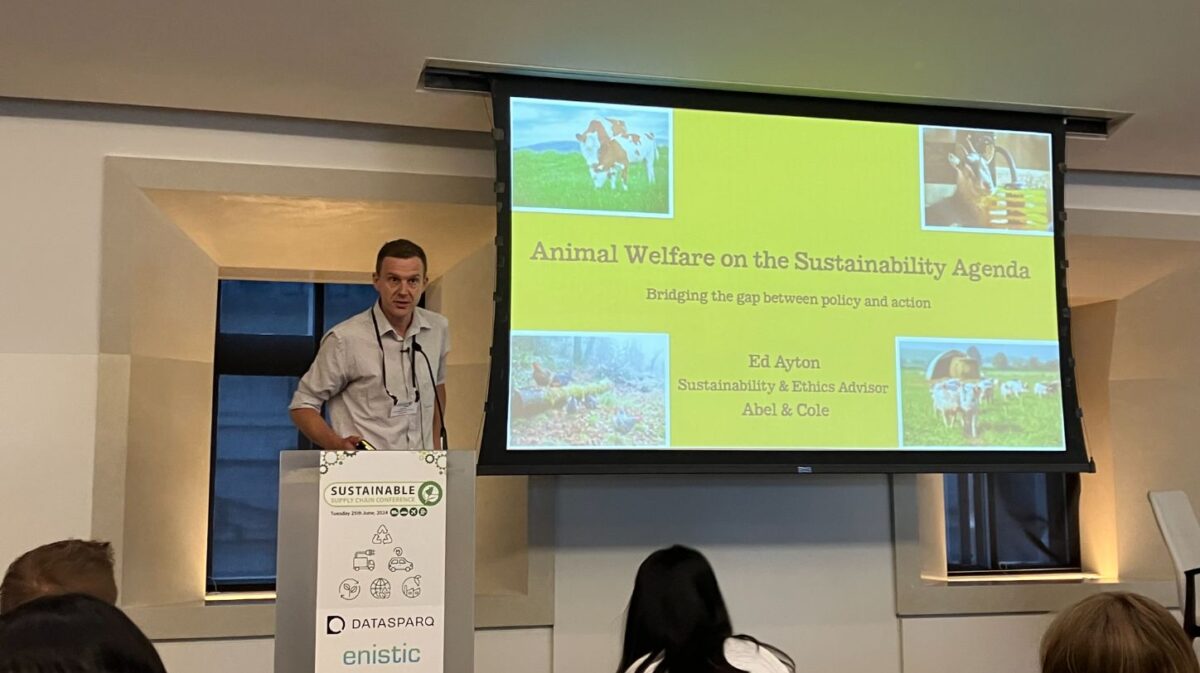
Ayton outlined the existing legislation in place with regards to animal welfare and acknowledged the various advantages of having a solid animal welfare policy as a business.
He said that poor animal welfare standards can lead to legal, reputational and customer-based repercussions. “An accusation of animal cruelty or neglect sticks and is up there with modern slavery,” Ayton said.
Furthermore, he stated that there is a business case for ensuring animal welfare, with business benefits ranging from PR opportunities to potential improvements in product quality.
Ayton also emphasised the value of openness in an animal welfare policy, outlining how flexibility can be achieved, how non-compliances can be resolved and how a supply chain can be involved in continuous improvement.
When asked by Logistics Manager about public demand for their products to be produced in a sustainable and ethical manner in spite of potential inconvenience, Ayton noted that much of the inconvenience to the customer is “justifying cost”, which comes from the additional expense associated with ensuring more stringent processes.
However, he claimed that with changing consumer attitudes and tightening regulations, it is becoming more costly not to take action on issues like sustainability and animal welfare.
At 12:15, in the final session before lunch, founder and chairman of carbon accounting software provider Enistic Darryl Mattocks took to the stage. His session, entitled ‘Collecting data for supply chain analysis: using carbon accounting to measure, report and reduce emissions’ covered how data insights can be used to reduce carbon emissions in the supply chain.
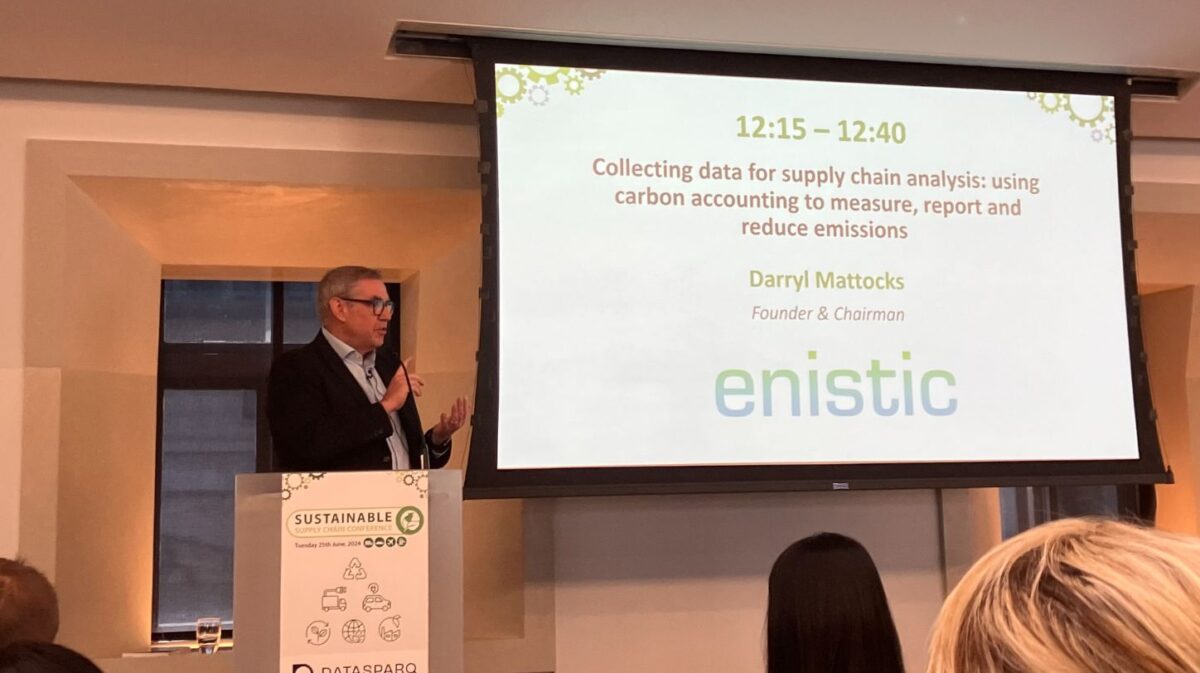
“Scope 3 is massive and the problems in collecting data are significant,” Mattocks said. He emphasised the importance of having “a goal to aim at or a target to hit” and the need to “engage senior staff”.
Speaking about the challenges of gathering Scope 3 data, he said: “Suppliers’ data will most probably be estimates [and] estimation techniques are generally inaccurate and prone to change.”
He identified the impact of economies of scale and the likelihood that larger companies have more sway with their suppliers than smaller businesses.
Mattocks encouraged businesses to introduce a gradual and cascading approach to improving Scope 3 sustainability, beginning with progress with Tier 1 suppliers and continuing through to Tier 3 suppliers over a period of several years. He also encouraged business to rate their suppliers based on sustainability, confidence and social impact.
He explained how AI can be “a good starting point” to approaching Scope 3 emissions, especially for large companies with a plethora of suppliers, where keeping track of Scope 3 emissions would be particularly difficult. He also said that figures already disclosed by suppliers in company accounts can be used to get a better understanding of Scope 3 emissions.
That brings us to the end of this morning’s jam-packed agenda, but there is still more to come this afternoon. Logistics Manager will bring you all the coverage of the second half of the Sustainable Supply Chain Conference later today.
Click here to read the highlights from the afternoon!


